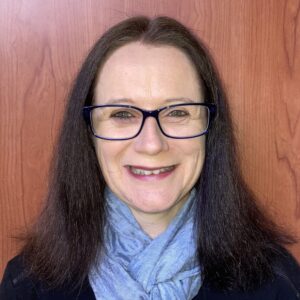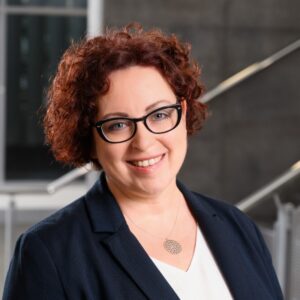What is the Inspirational Research Grant?
TOGA’s Inspirational Research Grant has been created from philanthropic donations to increase research into prevention, treatment, or improved lives of those living with thoracic cancers. 2024 is the first year the grants have been awarded, each worth AUD $50,000, with the funding to be used over a two year period. To be successful, projects must have been designed in consultation with consumer representatives.
The 2024 Grant Recipients

Project:
Developing a Clinical Composite Score (CCS) for wild-type, metastatic non-small cell lung cancer (mNSCLC), to identify patients at risk of poorer outcomes, and co-design solutions to improve outcomes for regional patients to bridge the metropolitan vs regional gap.
Summary:
People with lung cancer that has spread to other organs usually don’t live more than five years. This outcome is worse for those who live in regional or rural areas compared to those who live in the city. Our study is to create a scoring system that will help identify lung cancer patients that are at higher risk of poor health outcomes, and create ways to improve these outcomes.
The focus of this study will be regional/rural and city people with the most common type of lung cancer, non-small cell lung adenocarcinoma, which has also spread to other organs in their body (metastatic). We have already collected data on more than 300 of these patients over the last 6 years. We will use these data to create a lung cancer risk scoring system that will assist in identifying areas that can be improved, to enable better health outcomes for lung cancer patients in our community.
About Dr Faisal:
Dr Wasek Faisal, Medical Oncologist, BRICC; Grampians Health Clinical Director, Grampians Integrated Cancer Services (GICS); Visiting Senior Research Fellow, La Trobe University, Melbourne.
Dr Faisal is a mid-career medical oncologist and clinical researcher. He works in a regional setting with a view to provide best-practice oncology care to patients. Dr Faisal drives equitable access to world-class clinical trials locally for patients.
![]()

Project:
Defining epigenetic causes of immunotherapy resistance through liquid biopsies in lung cancer.
Summary:
Lung cancer is the commonest cause of cancer death in Australia and globally. The poor outcomes of lung cancer are due to patients presenting with disease that has spread beyond the primary tumour. This represents metastatic disease, which is not amenable to surgery. Thus, the mainstay of systemic treatment has been chemotherapy.
In recent years, immunotherapy drugs have revolutionised the treatment of metastatic lung cancer. However, 95% of people receiving immunotherapy drugs can develop resistance with the disease returning.
This project aims at understanding how resistance to immunotherapy develops. With a proposal to store part of the blood samples taken, the analysis of circulating tumour DNA in these blood samples may reveal indicators of an immunotherapy drug is likely to succeed or fail. This can prompt a change in treatment approach. The discovery of such indicators has the potential to lead to the development of new drugs that can delay resistance and lead to better outcomes for patients.
About Dr Leong:
Dr Tracey Leong, Director of Bronchoscopy and Pleural Service, Austin Health; Consultant Respiratory and Sleep Physician, Austin Health.
Dr Leong is a clinician-scientist with dual appointments as a Respiratory Physician and Director of Bronchoscopy at Austin Health.
Her research interests are in utilising minimally invasive bronchoscopic technology to advance translational research in cancer. She is leading the TRACKER initiative of a national biobank for metastatic lung cancer.

Project:
Implementing pre-habilitation into lung cancer care.
Summary:
Individuals with lung cancer may need surgery to remove the cancer. This surgery is not without risk. Complications after major surgery are common, and can occur in up to a third of patients. Many patients embark upon this surgery without a complete understanding of the consequences. Recent research, supports the role of preparing patients for lung surgery through ‘prehabilitation’. This involves several components of care from different health professionals. To date little of this research is undertaken in Australia.
In this proposal, we want to find how programs can be best supported and at what frequency. This will have the longer-term aim of introducing more prehabilitation programs.
Additionally, we want to understand if it is feasible to introduce prehabilitation education via videoconferencing (telehealth) and video resources for patients. The video resources will include the surgical process, exercise, nutrition, pain management, respiratory care and early mobility, and how to train the respiratory (breathing) muscles using a small handheld device. Training the respiratory muscles will be monitored by a physiotherapist using telehealth until surgery.
This pilot program will assist in developing a larger program. The insights gained will lead to scaling the prehabilitation package for those having lung cancer surgery.
About Dr Edbrooke
Dr Lara Edbrooke, The University of Melbourne, Physiotherapy Department, Senior Lecturer; The Peter MacCallum Cancer Centre, Allied Health Research Development Lead.
Dr Edbrooke is an early career physiotherapy researcher with an upward trajectory since completing her PhD in 2019. Her research focuses on improving outcomes for people with cancer. Her key interests are leading and contributing to research that can reshape multi-disciplinary models of care to better support patients across the care continuum.

Project:
Breathlessness in lung cancer study: making breathlessness symptom management usual practice in lung cancer therapy.
Summary:
Many people with lung cancer experience breathlessness. Feeling breathless or short of breath can make people feel as though they are suffocating or drowning. These feelings can result in people being frustrated, anxious, and scared. The impact of feeling like this on people’s lives is significant.
Breathlessness can be treated with medicines and non-drug strategies. But it’s often hard to do these strategies at home, especially if people need to change their daily routines. The difficulty comes in the lack of time or cost involved in making the medicines a regular part of life.
This study is going to figure out the best way to help people with their breathlessness. Researchers will create a plan to support patients and their families at every stage of their lung cancer journey.
About Dr Brunelli
Dr Vanessa Brunelli, Research Fellow, Office of the Deputy Vice Chancellor (Research and Sustainable Futures); Vice Chancellor’s Unit, University of Wollongong.
Vanessa leads a large translational research program comprising three complementary parallel streams of advanced practice lung cancer nursing, breathlessness symptom management, and digital health technology. These streams converge to inform a specialist lung cancer nurse model of care.
Vanessa also maintains a strong commitment to leadership and development. She is the immediate past Chair of the Australia and New Zealand Lung Cancer Nurses Forum (ANZ-LCNF), Australia Representative on the National Leads’ Sub-Committee of the International Thoracic Oncology Nurses Forum, and Scientific Committee Member of the Thoracic Oncology Group of Australasia.

Project:
The application of a 3D cell culture model to assess the utility of novel immunotherapy drugs for the treatment of mesothelioma
Summary:
Mesothelioma is an aggressive cancer caused by asbestos with limited treatment options. The current treatment for mesothelioma includes combination immunotherapy drugs, such as nivolumab and ipilimumab. This treatment showed a slight improvement in survival of mesothelioma patients compared to standard chemotherapy. Finding newer and more effective immunotherapy drugs is crucial for mesothelioma patients.
This project will optimise a three-dimensional (3D) cell culture model that is more akin to the tumour microenvironment in humans. This model can rapidly assess the anti-cancer activity of new immunotherapy drug combinations that may be superior to the nivolumab and ipilimumab combination immunotherapy treatment that is currently used.
About Dr Shi
Dr Hauikai Shi, Postdoctoral Research Fellow at The Asbestos and Dust Diseases Research Institute (ADDRI).
Dr Shi joined ADDRI after having been awarded a PhD in Jan 2021. Here he utilised his expertise in immunology and animal modeling in the field of thoracic cancer research.
Dr Shi established preclinical cell and animal models to develop a novel approach that combines beneficial immunotherapy with anti-cancer natural products to improve the treatment outcome of the current incurable cancer malignant mesothelioma.
Dr. Shi has published in prestigious peer-reviewed papers that testify his contributions to the field of thoracic cancer research. Here he designed and carried out experiments, analysed the data, and wrote manuscripts.
Are you ready to make a difference?
Apply for a TOGA Inspirational Research Grant today! Your research could lead to groundbreaking discoveries and improve the lives of countless individuals affected by thoracic cancers.
Let’s work together to shape the future of thoracic oncology research.